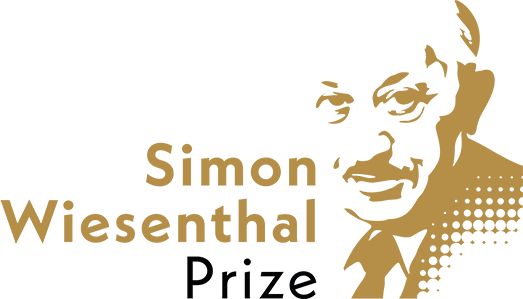Jury
The Simon Wiesenthal Prize Jury is appointed by the Board of Trustees of the National Fund for the duration of one legislative period. It submits a shortlist of potential prizewinners to the Board of Trustees.
In addition to a chairperson, the jury consists of five other members, one of whom should be a direct relative of the person who gave the prize its name, Simon Wiesenthal. The President of the Jewish Religious Society in Austria as well as recognised figures from public or cultural life in Austria or abroad or persons with an academic reputation in the field of contemporary history or in another relevant academic field are appointed as other members.
After the end of the entry submission period, the jury will evaluate the entries received within four weeks and submit a written, reasoned shortlist of up to five candidates to the Board of Trustees. The Board of Trustees decides the winners on the basis of the Simon Wiesenthal Prize jury's shortlist.
Members
Brigitte Bailer
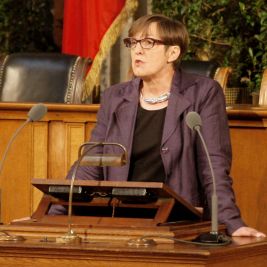
"Simon Wiesenthal dedicated his life's work to bringing the crimes of the Nazi era to justice for the victims, and, in later years, also to combating neo-Nazism and Holocaust denial. For many years, he was vilified in Austria for his efforts, and it was far too late that he received the recognition he deserved. I hope this award will help to keep alive the memory of Simon Wiesenthal's commitment and struggle so that it was not in vain."
Brigitte Bailer(-Galanda), born 1952 in Vienna, Mag. rer. soc. oec., Dr. phil., lecturer in Contemporary History at the University of Vienna. Since 1979 research associate, 2004-2014 Scientific Director of the Documentation Centre of Austrian Resistance, 1998-2003 Deputy Chairwoman of the Historical Commission of the Republic of Austria for Research on Property Seizures during the Nazi Era and Restitution and Compensation since 1945, main areas of work: Resistance and persecution 1938-1945, right-wing extremism after 1945 esp. Nazi apologetics and Holocaust denial, Austria's treatment of the victims of Nazism and its Nazi past – restitution, compensation, victim welfare.
Oskar Deutsch
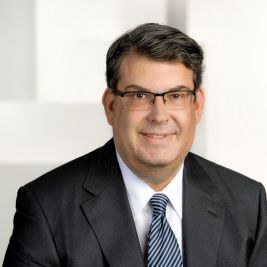
"The Simon Wiesenthal Prize sends an important signal and is an incentive for people and organisations that follow his example by demonstrating civic engagement, working to educate about the Shoah and to combat antisemitism – thereby contributing to the continued development and strengthening of Austria and all of Europe according to humanistic principles."
Oskar Deutsch, born in 1963, has been President of the Jewish Community Vienna and the Jewish Religious Society Austria since 2012. Before that, he was Vice President from 1999. He studied at the Vienna University of Economics and Business Administration and was the managing director of Alvorada for a long time, which he steadily expanded until it was sold. Since his youth, Oskar Deutsch has been active in various community organisations on a voluntary basis. He is a founding member of the Maccabi Vienna Sports Club and was Vice President of Maccabi Europe. Since 1993, he has been head of the Jewish Commmunity's cultural affairs and head of various commissions in the areas of real estate, youth, etc. Editor of "Die Zukunft Europas und das Judentum. Impulse zu einem gesellschaftlichen Diskurs" (2017).
Ariel Muzicant

"The 'second generation' only knew about the Shoah from the stories told by their parents. Simon Wiesenthal was our mentor, he taught us young people how to deal with this difficult subject. His saying 'justice, not revenge' has left its mark on many people."
Dr Ariel Muzicant, born in Haifa, studied Medicine in Vienna, where he obtained his doctorate in 1976. From 1977, he worked as a certified real estate agent and entrepreneur.
To date, he is Vice-President of the European Jewish Congress (EJC) and a board member of the World Jewish Congress (WJC). In addition, he was President of the Jewish Community Vienna (IKG) from 1998 to 2012 and founder and President of the Zwi Perez Chajes School in Vienna from 1980 to 1994. Between 1978 and 2012, he was also responsible for rebuilding the infrastructure of the Jewish Community in Austria, including kindergartens and synagogues. Ariel Muzicant was appointed as a representative by the family of Simon Wiesenthal.
Katharina von Schnurbein (Chairperson)
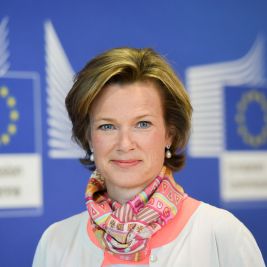
"It is Jewish people who are directly affected by anti-Semitism, but ultimately it threatens all of us, our values and our community. Democracy needs to be defended. This requires civil courage. The Simon Wiesenthal Prize shines a spotlight on courageous civic engagement and thus hopes to inspire many citizens in Austria and Europe to take a stand against hatred and stand up for respectful coexistence."
Katharina von Schnurbein, M.St. MES, born 1973 in Regen, Antisemitism Officer of the EU Commission since December 2015. Former advisor to Commission President José Manuel Barroso on dialogue with churches, religions and non-confessional organisations. Press spokesperson for the Czech EU Commissioner Vladimir Spidla (2004-2010); press spokesperson for the EU Delegation in Prague (2002-2004). Degrees in Political Science and Slavonic Studies in Prague, Bonn (MES) and Oxford (M.St.). EU Fellowships at the European University Institute in Florence 2017/18. Awarded the European Human Rights Prize by B'nai B'rith Europe 2018.
Monika Schwarz-Friesel
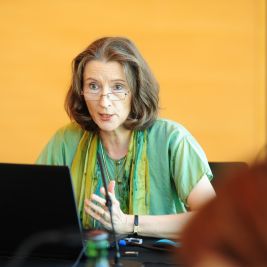
"The Simon Wiesenthal Prize sends an important signal to society as a whole in the fight against antisemitism and for the culture of remembrance. It also honours the memory of an inspirational person who worked tirelessly to prevent the rupture in civilization that was the Shoah being forgotton."
Prof. Dr. Dr. h.c. Monika Schwarz-Friesel has been a full professor at the Institute for Language and Communication at the TU Berlin since 2010. Her research focuses on modern Jew-hatred, antisemitism and language, verbal violence and digital communication. From 2004 to 2010 she led the project "Antisemitism in Modern Germany" in cooperation with Brandeis University (Boston, USA) and the Hebrew University of Jerusalem, and from 2014 to 2020 the DFG-funded pilot project "Antisemitism 2.0 — The Spreading of Jew-hatred on the World Wide Web". As an expert on modern Jew-hatred, she advises numerous institutions, including the ZEIT Foundation's digital campaign "StopAntisemitismus.de", and she is Chair of the Board of Trustees of the Rabbi Leo Trepp Foundation.
Barbara Stelzl-Marx
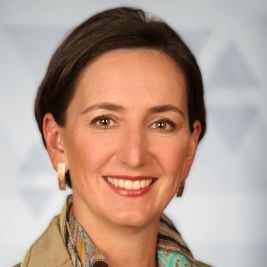
"The traces left behind by war and violence are often invisible at first glance, but they are present subcutaneously, seared into biographies and landscapes. Simon Wiesenthal made it his life's work to uncover these traces – by coming to terms with the Holocaust and prosecuting Nazi criminals. In accordance with his motto 'Enlightenment is Defence', the prize named in honour of Simon Wiesenthal is intended to contribute to the remembrance of the victims of the Nazi regime as well as to the preservation of democracy and human rights."
Barbara Stelzl-Marx, University Professor of Contemporary European History at Karl Franzens University Graz, Director of the Ludwig Boltzmann Institute for Research on the Consequences of War, Graz – Vienna – Raabs, and Vice-President of the Austrian UNESCO Commission. In 2020, she was awarded "Academic of the Year". Her research focuses on the consequences of the Second World War, the Cold War, children of war, migration, Stalin's propaganda for Soviet DPs, remembrance and commemoration. She is currently leading research projects on "Lebensborn" (Austrian National Bank and the province of Lower Austria) and on Czechoslovak intelligence services in Austria.
Frequently Asked Questions
Prospective prizewinners have made an outstanding contribution – through projects, initiatives or in other meaningful ways – towards combating antisemitism and/or educating the public about the Holocaust by
- actively fostering, consolidating and imparting knowledge and awareness about the Holocaust;
- raising awareness in society about the dangers of antisemitism in the present;
- increasing understanding of the mechanisms and consequences of antisemitism and thereby strengthening democratic culture in everyday life;
- acting as a beacon of civil courage, thereby highlighting the value and importance of the involvement of each and every individual;
- advocating for measures to counteract antisemitism and all forms of Holocaust relativisation;
- fostering understanding and sensitivity in areas where a critical attitude towards antisemitism should be particularly encouraged;
- contributing to the development of a common awareness in the fight against antisemitism
- or otherwise contributing towards a culture of remembrance that is innovative, sustainable and dedicated to educating people.
Special consideration will be given to projects, initiatives and achievements that create fresh impetus and place new accents, that set an example for others and appear capable of having a lasting impact on the present and the future.
Yes. Candidates may submit an entry in their own right or be nominated by a third party.
Yes. Also eligible to submit an entry are, for example, civil society organisations such as clubs, associations, foundations, non-profit limited liability companies; interest groups, regional affiliations such as local clubs and associations, i.e. organisations emerging from the middle and grassroots of society; human rights organisations; non-governmental organisations; welfare institutions, cultural organisations, educational and training institutions; youth organisations, family associations, students and student groups, apprentices and apprentice groups, as well as youth and schoolchildren groups.
Yes. Individuals or groups from civil society in Austria or abroad can submit an entry or be nominated for the Simon Wiesenthal Prize, regardless of their nationality.
The Board of Trustees will choose the prizewinners on the basis of the shortlist drawn up by the Simon Wiesenthal Prize Jury.
Candidates will be assessed by the Simon Wiesenthal Prize Jury on the merits of their entries and in accordance with the Rules of Procedure issued by the Board of Trustees.
The Simon Wiesenthal Prize Jury will assess the candidates on the sole basis of the information contained in the submitted documents and submit a shortlist of potential prizewinners to the Board of Trustees within four weeks, providing reasons for its shortlisted entries in writing. The jury may shortlist up to five candidates and rank them in assessed order of merit.
The Simon Wiesenthal Prize is endowed with an annual sum of 30,000 euros. It is awarded in two categories:
- Civic engagement to combat antisemitism (7,500 €)
- Civic engagement to promote Holocaust education (7,500 €)
In addition, a main prize endowed with 15,000 € will be awarded for outstanding civic engagement to combat antisemitism and/or promote Holocaust education.
Entries must be submitted online using the form available on the Simon Wiesenthal Prize website. Attachments must be uploaded electronically.
The entry should state why the candidate(s) would be (a) worthy recipient(s) of the prize and demonstrate the candidate’s achievements in the areas set out in the Prize Announcement.
On the entry form the candidate must provide all information required by the National Fund to
- ensure that the candidate meets the formal entry requirements
- examine whether the activities subject of the entry comply with the objectives of the prize
